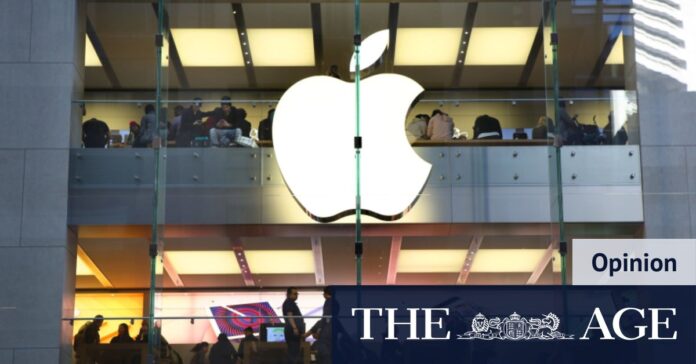[ad_1]
Those fines were imposed under the EU’s existing competition policy laws, where the actions have taken years to reach their conclusion. From Wednesday this week, however, the big tech companies are going to have to deal with an even more intimidating regime.
On Wednesday, the full force of a new set of laws that were enacted in 2022 will apply after the biggest tech companies were designated as “gatekeepers” under the legislation last September and given six months to comply with the new Digital Markets Act (DMA).

EU’s competition chief, Margrethe Vestager, said Apple had broken the EU’s antitrust laws for decades by restricting the developers from informing consumers of alternatives outside the Apple ecosystemCredit: AP
The Digital Services Act (DSA), which went live last year, forces tech giants to take responsibility for the content they carry, forces them to moderate their content and to be more transparent with users of their platforms and regulators. (Elon Musk’s X is already being investigated for failing to moderate illicit content and disinformation, among other issues).
The DMA deals with anticompetitive behaviours by companies designated as “gatekeepers” – companies with EU revenues of more than €7.5 billion or market capitalisations above €75 billion.
Companies which meet those criteria are prohibited from linking access to one service to purchases from another, giving preferential treatment to their own products or using the data they collect from users for their own advantage. It creates price transparency for advertisers, data portability for users and will force companies to open up their payments technology to third parties.
Loading
It also imposes fines of up to 10 per cent of the infringing company’s global revenues. Apple had total revenues of $US383 billion ($588 billion) last year.
The DMA doesn’t, as the pre-existing legislation did, require detailed analysis of the consumer harm caused by the offending company.
If the EC can demonstrate that a company has broken one of the DMA rules, that harm is presumed. It will be a more efficient and far quicker way to bring anti-trust actions from the EC perspective – and far more intimidating for the companies.
In the Apple case, the EC said a significant proportion of the harm Apple caused to consumers was non-monetary. It said Apple’s terms had resulted in a “degraded user experience” and that the terms amounted to unfair trading conditions.
The EU has historically had far more prescriptive and punitive competition laws than most other jurisdictions and has led the way in responding to the dominance of the big tech platforms.
Where regulators in other jurisdictions have tried to weigh up the balance of the innovation and user benefits the platforms generate against the anticompetitive implications of their dominance and their “walled garden” strategies, the EU is more focused on the implications of anticompetitive business models for consumers and third parties.

The fine follows a five-year investigation by the European Commission (EC), sparked by a complaint by Spotify that accused Apple of anticompetitive behaviours.Credit: Bloomberg
It regards them as 21st century utilities, like banks and telecommunications companies and its new laws reflect that philosophy.
The size and importance of the European markets means the biggest of the tech companies will have few options but to adapt their businesses to the new legal environment.
Loading
Apple has already said it will open its IOS system to other app stores and make it possible for developers to accept payments through alternative payments platforms or direct customers to cheaper ways to sign up for their services.
The new fees and restrictions it has proposed have, however, already been met with a wall of criticism from developers, who argue they have been constructed to technically comply with the new EU environment while making it uneconomic for them to venture outside the Apple ecosystem.
It’s not only the EU that is toughening its competition laws and tailoring new laws to the particular issues raised by the dominant tech platforms.
There has been a series of antitrust cases against the platforms in the US and significant discussion, if little actual legislation, in a US Congress where there is bi-partisan concern about the market power and anticompetitive structures and behaviours of the mega techs.
The Biden administration has had some discussions with the Europeans about co-ordinating and harmonising trans-Atlantic regulation of technology companies, albeit nothing has yet come of them.
The EU has historically had far more prescriptive and punitive competition laws than most other jurisdictions and has led the way in responding to the dominance of the big tech platforms.
Unsurprisingly, the big techs (with the notable exception of Facebook) have been lobbying heavily against any such harmonisation, even though (or perhaps because) it would become the global defacto standard and therefore would simplify the task and reduce the cost of complying with the raft of different competition laws in different countries.
Regardless, the merging philosophy among regulators and legislator is to shift some market power from the platforms to users and competitors, make the walled garden structures that protect their dominance more porous and create far greater transparency into what the platforms are doing.
Loading
Whether or not the DSA and DMA are overly intrusive and tilt the balance between innovation, competition and consumer protections too far away from innovation, the dominant tech platforms are going to be subjected to more regulation and the threats of the kind of mega fines the EC has hit Apple with in the key jurisdictions they operate within.
They’ve become too big, too dominant and too aggressive in protecting and exploiting that dominance for regulators and legislators to ignore.
Read more:
[ad_2]
Source link


